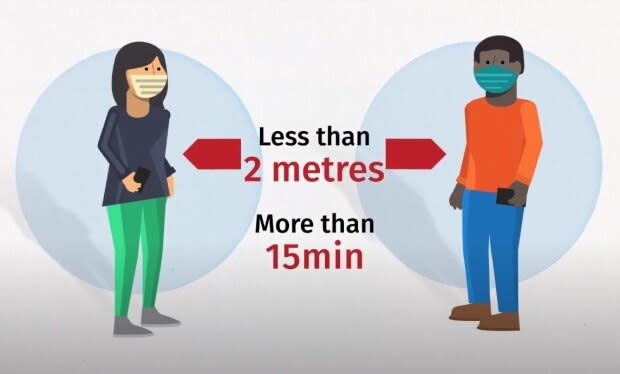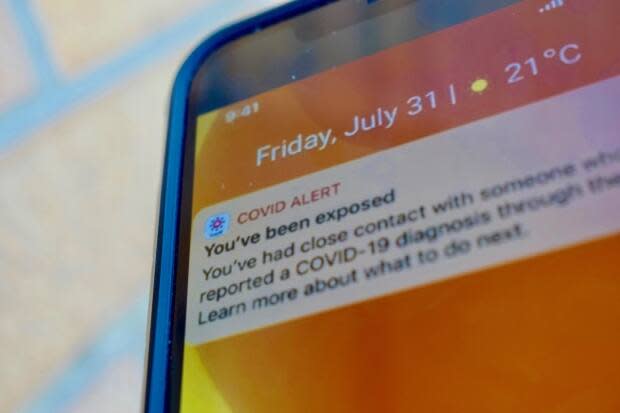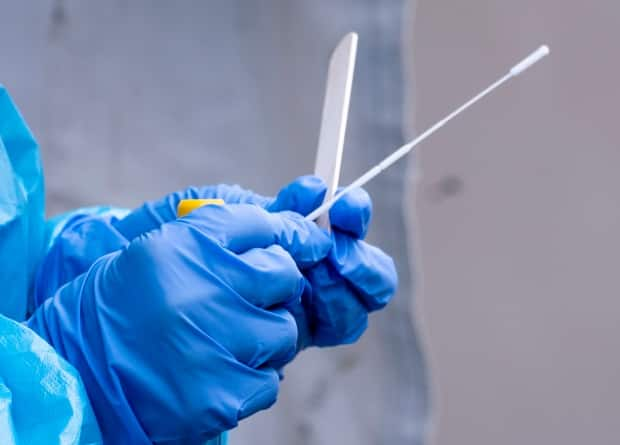COVID Alert app now active in New Brunswick
New Brunswickers can now start using COVID Alert, Canada's COVID-19 exposure notification app, which alerts users if they have been exposed to someone who tested positive for the virus.
Starting Friday, residents who test positive for COVID-19 can receive one-time keys from Public Health to enter into the app.
Dr. Jennifer Russell, the province's chief medical officer, said she is encouraging New Brunswickers to download it.
"We don't know how many cases and outbreaks we're going to have in the fall and moving forward," she said in an interview on Shift NB. "We want to make sure anything [...] that will help our teams stay on top of any outbreaks — that we have that at our disposal."
The voluntary tool uses bluetooth to exchange random codes when a user is near with other phones. When someone tests positive for the virus, they can voluntarily tell the app which will check the codes of people who were in close contact for more than 15 minutes.
People who were exposed will be notified by the app and receive advice from public health officials on what to do next.
The app does not track user locations or personal information and is supported by the privacy commissioner of Canada.

Russell said the app does not take away from the importance of continuing other COVID-19 prevention measures, such as physical distancing, hand washing and wearing non-medical face masks.
"This is another tool in our toolbox for trying to deal with COVID-19," she said.
New Brunswick joins Ontario, Newfoundland and Labrador, and Saskatchewan in making one-time keys available to residents. More than 2.5 million Canadians have downloaded the app since it was launched in late July.
It is only available to users of Apple and Android phones that have been released within the past five years and are running recent software.
As of Sept. 17, according to the Public Health Agency of Canada, 275 people who have tested positive have entered keys in the app around the country.
Russell said the province has been working with federal partners to be part of the app since it was first developed. But it took behind-the-scenes technical work before New Brunswick could make keys available for residents.

No new cases, uptick in testing
The latest figures from Public Health on Friday show no new cases of COVID-19 in New Brunswick.
One case was reported recovered, dropping the total number of active confirmed cases in the province to one.
The only active case is in the Moncton region, or health Zone 1, and Public Health says the individual is self–isolating.
New Brunswick has recorded 194 cases of COVID-19 since the pandemic began in mid-March. Two people have died and 191 have recovered.
On Thursday, 618 tests were conducted for COVID-19. A total of 68,668 tests have been conducted since the pandemic started.

Public Health spokesperson Bruce Macfarlane said testing has increased in recent days through a new online self-assessment.
"People are getting vigilant to help limit the spread," he said.
Through the online tool, people can answer a series of questions to determine if they should get tested for COVID-19. If the advice suggests it, a request can be submitted through the website.
It can take between 24 to 48 hours for the test assessment centre to schedule an appointment.
Travel bubble changes
The province tightened its extended travel bubble yesterday after a spike of cases in a bordering Quebec region.
Residents of Témiscouata Municipal Regional County will no longer be able to cross into New Brunswick without self-isolating for 14 days. They must also meet the criteria for entry into the province.
The extended bubble with Avignon Municipal Regional County, near Campbellton, remains in place.
The change comes after the Quebec government changed the alert level in the Bas-Saint-Laurent region of Quebec, which includes Témiscouata. The region has reported more than 140 cases since Sept. 6.
What to do if you have a symptom
People concerned they might have COVID-19 symptoms can take a self-assessment test on the government website at gnb.ca.
Public Health says symptoms shown by people with COVID-19 have included: a fever above 38 C, a new cough or worsening chronic cough, sore throat, runny nose, headache, new onset of fatigue, new onset of muscle pain, diarrhea, loss of sense of taste or smell, and difficulty breathing. In children, symptoms have also included purple markings on the fingers and toes.
People with one of those symptoms are asked to:
Stay at home.
Call Tele-Care 811 or their doctor.
Describe symptoms and travel history.
Follow instructions.


